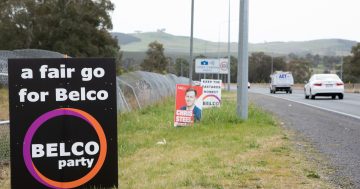
She-Who-Must-Be-Obeyed and I were chatting about the way public funding is doled out in the ACT recently and whaddya know? An article hit the media about disclosure and limitations on federal donations and spending for elections. Now, didn’t this open a can of worms for our often lively discussion?
Firstly, just to re-acquaint you on what is the go in the ACT, the law changed a bit recently. A wander through the ACT Electoral Commission’s website is a revealing trip.
The Assembly changed the rules to remove the cap of $10,000 on donations but lowered the limit on disclosure of donations to $1,000. The idea here is that receiving money didn’t necessarily corrupt the system as long as the donations were publicly disclosed so that everyone knows where campaign funding comes from.
But, they decreased the limit per candidate on expenditure from $60,000 to $40,000. This needs to be taken with the view that the Assembly had just increased in size from 17 Members to 25 Members. Under the old system, a party fielding 17 candidates would attract an expenditure limit of $1,020,000 but in an Assembly of $25 Members, the maximum a party could attract is now an indexed (to CPI) of $1,000,000, thus decreasing the spending limit by $20,000.
From where I’m sitting, it is the expenditure which influences elections, not the donations. And it doesn’t matter how rich a party is, it can only spend up to the limit.
But of course, others can spend up to $40,000 if they are a third party campaigner or an associated entity, like unions, business entities formed for the purpose of supporting a party, or a political lobby outfit like GetUp!
So if you’re a member of a political party and your mob fields a full list, you get the corporate benefit of up to $1,000,000 in campaigning. But stiff if you contribute your own money to get yourself elected within the party structure. In the ACT Liberals, a candidate must cough up about $3,000 to be pre-selected and then are expected to contribute to the party coffers. In the ALP, fundraising goes into a central fund, but candidates can spend their own cash. In both cases though, candidates are given a spending limit (which is incorporated into the party’s overall spending limit) so that the corporate effort is not unduly compromised.
The votes gained by these party preselected candidates are aggregated and as long as the party as a whole gets more than 4% of the vote in a given electorate, the public funding of $8.23 per vote as at 2016 is credited to the party’s bank account.
The candidate gets SFA. Successful candidates get applause and unsuccessful ones get condolences.
I know of one candidate in a previous election who mortgaged the family home, spent over $30,000, got elected and received not a penny from the party. A claim against taxation was possible but that only reduced the burden. This is not an isolated case. My advice to intending candidates is that if they don’t have $10,000 they can throw away, don’t even think about it!
For independent candidates, and non-party MLAs, the limit on their expenditure is $40,000. But to spend this kind of money, you have to either have it or raise it. Now, who is going to fund an unknown (or even a well-known) independent candidate and not want anything in return?
These candidates also have to get at least 4% of the vote in the electorate or they have wasted the spending.
In the electorate of Brindabella in 2016, there were 48,238 votes cast. So you needed 1,930 votes to get your electorate funding. In Ginninderra it was 48,526 (1,941), Kurrajong 49,900 (1,996), Murrumbidgee 51,296 (2,052) and in Yerrabi 52,500 (2,100).
Now you’d reckon that it should be a breeze to get around 2,000 people to vote for you eh? Not so. The current crop of Assembly members holds no independents at all. And… the major two parties fielded 5 candidates in each electorate so earning the maximum spending limit but Labor got 12 seats and the Libs 11 seats. This means that there were 13 Labor and 14 Liberal candidates who lost out and got nothing for their efforts and no recompense for their expenditure. If each one spent about $10,000 this would be $130,000 and $140,000 respectively down the drain.
But the parties themselves got a heap of money refunded. Labor attracted 93,811 votes and got about $772,100, the Libs 89,632 votes ($737,700) and the Greens 25,096 votes ($206,500). According to the Electoral Commission’s disclosure returns, the ALP spent $985,242, the Libs $962,020 and the Greens $320,687. So the taxpayer refunded the ALP about 78%, the Libs 77% and the Greens 64%.
That’s democracy for you. Or is it?
Why is it that a candidate has to get 4% when a party can aggregate their 5 candidates to achieve the same 4%? Why is it OK for a party to pocket the public funding and make the unsuccessful candidates pay for the privilege of being cannon fodder? Successful candidates get rewarded with a four-year contract at about $200,000 a year (and more if a ministerial or leadership position comes their way).
My SWMBO and I reckon that in a true democracy, public funding should be given to the candidate. Period. If a party wants to raise funds and put a corporate entity to the electorate, fine, but not to the detriment of candidates themselves.
So, our system is that a candidate gets $8.23 (indexed to CPI) for every vote they get. If you get 15,000 votes you get up to $123,450 but if you get 200 votes, you get up to $1,646.
But we also say that you don’t get reimbursed simply a per vote figure, you get reimbursed $8.23 per vote up to the limit of your personal expenditure on the election. And this amount is deducted from the total public funding allocated to the party in which you are registered.
But… and here’s the rub.. there needs to be protections against rorters. I remember in a federal election Pauline Hanson did not win, but as a party-heavy, got over the minimum votes limit and pocketed hundreds of thousands of dollars for losing the election. Her party coughed up the campaign costs but she pocketed the public funding.
Democracy is a funny animal, and public funding to prevent corruption is a vexed issue. Any thoughts psephologists?





















